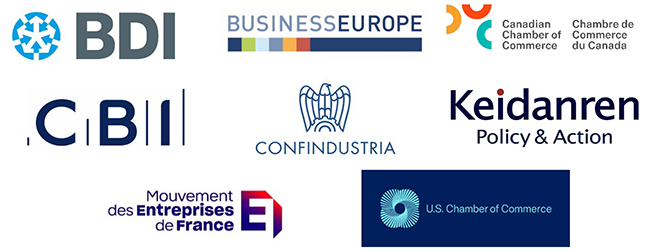We, the business federations of the Group of 7 countries ("the B7"), under the Presidency of Keidanren (Japan Business Federation), have serious concerns about the recent proposals to revise the OECD Guidelines for Multinational Enterprises.
Following the OECD Ministerial Meeting on Responsible Business Conduct that took place on 14-15 February, and ahead of the OECD Council Ministerial in June, we express our commitment to working together to develop realistic and workable Guidelines. Our organisations and our business members remain a constructive and critical partner on responsible business conduct and continue to support the promotion and implementation of the existing OECD MNE Guidelines.
However, there are serious concerns with the latest available draft of the Guidelines, provided by the OECD Secretariat, which jeopardize broad business buy-in and consequently their potential impact.
We hope that a collaborative approach between government, business and key stakeholders can create a conducive environment for growth, with provisions on responsible business conduct that are practical, coherent and implementable, lead to positive impact on the ground, while avoiding unintended consequences and significant administrative burden. The private sector has a major role to play in spreading responsible practices, but companies cannot replace effective government action and diplomatic dialogue. The OECD must avoid transferring the responsibilities of states/governments to companies.
The Guidelines must reflect the realities of doing business and the dynamics of a multitude of sectors and business models. Due diligence expectations should be proportionate to the size and means of the company in question and it must be clarified that the OECD Guidance documents on due diligence are voluntary as they provide practical support to companies. Under no circumstances should the Guidelines establish company responsibility for factors beyond their control. The extension of due diligence expectations to the full downstream part of the value chain is in practice unworkable for business.
Too burdensome and rigid supply chain rules risk being counterproductive. As such rules disproportionately increase costs and risks for doing business in developing and emerging economies, they force companies to disengage from markets and leave the field to competitors from non-likeminded countries who may not be as responsible in their conduct. Rather than incentivizing our companies to "cut and run," they should be encouraged to "stay and improve."
It should be clear the Guidelines are intended, and therefore drafted, as a set of aspirational "non-binding principles and standards" that are "voluntary" and not "legally enforceable" in their own right. However, there is a trend for the OECD Guidelines to be effectively incorporated into legal requirements, such as with examples in the existing EU Taxonomy Regulation, or the forthcoming EU Corporate Sustainable Due Diligence Directive (CSDDD). The Guidelines and their commentary therefore need to be carefully drafted to avoid negative spill over effects and support business efforts to adopt their principles.
Finally, National Contact Points have proven to be appropriate bodies to monitor the OECD MNE Guidelines. They are not and should not become a part of the legislative system and indeed should be bolstered to ensure they can fulfil their mission as outlined by the Guidelines.
BIAC's letter to the OECD, dated 12 December 2022 and attached for reference, contains more comprehensive details of business concerns. As we understand the discussions will continue, we trust that these concerns can be fully addressed to ensure a successful outcome.
We remain committed to working together to drive responsible business conduct globally and promoting a free and open trade and investment environment. The B7 and our members look forward to continued meaningful business engagement through BIAC at the OECD.
The Business 7
- BDI
- BusinessEurope
- Canadian Chamber of Commerce
- CBI
- CONFINDUSTRIA
- Keidanren
- MEDEF
- U.S. Chamber of Commerce


